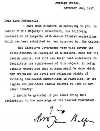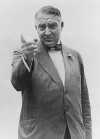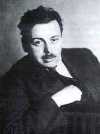 Bunka-no-Hi is a Japanese national holiday on which medals are awarded by the government to those who have made special contributions in the fields of arts and sciences. Winners are not always Japanese—the American Apollo 11 astronauts are among past honorees. This is also the anniversary of the adoption of Japan’s current constitution in 1946. The day was formerly celebrated as the birthday of Emperor Meiji, whose reign was known as the age of bummei-kaika—”civilization and enlightenment.” Today, this holiday serves to promote the love of freedom, peace, and cultural development. Discuss
Bunka-no-Hi is a Japanese national holiday on which medals are awarded by the government to those who have made special contributions in the fields of arts and sciences. Winners are not always Japanese—the American Apollo 11 astronauts are among past honorees. This is also the anniversary of the adoption of Japan’s current constitution in 1946. The day was formerly celebrated as the birthday of Emperor Meiji, whose reign was known as the age of bummei-kaika—”civilization and enlightenment.” Today, this holiday serves to promote the love of freedom, peace, and cultural development. Discuss
Source: The Free Dictionary
 Named an All-American at the University of Minnesota in 1929 as both a tackle and fullback, Nagurski turned pro to play for the National Football League’s Chicago Bears, becoming the archetypical pile-driving fullback of the 1930s. Although he was never the league’s rushing leader, Nagurski was nearly impossible to stop without a gain and often dragged multiple tacklers with him before going down. In addition to football, Nagurski competed in what other sport on a professional level?
Named an All-American at the University of Minnesota in 1929 as both a tackle and fullback, Nagurski turned pro to play for the National Football League’s Chicago Bears, becoming the archetypical pile-driving fullback of the 1930s. Although he was never the league’s rushing leader, Nagurski was nearly impossible to stop without a gain and often dragged multiple tacklers with him before going down. In addition to football, Nagurski competed in what other sport on a professional level?  Amala and Kamala were two so-called “wolf-girls”—feral children allegedly raised by a family of wolves before being found in 1920 near Calcutta, India, at eight and 18 months old, respectively. They were taken in by the rector of a local orphanage, who documented his observations of them in a diary for almost 10 years and claimed that, like wolves, the girls were nocturnal, did not allow themselves to be dressed, and walked on all fours. What other wolfish behaviors did they allegedly display?
Amala and Kamala were two so-called “wolf-girls”—feral children allegedly raised by a family of wolves before being found in 1920 near Calcutta, India, at eight and 18 months old, respectively. They were taken in by the rector of a local orphanage, who documented his observations of them in a diary for almost 10 years and claimed that, like wolves, the girls were nocturnal, did not allow themselves to be dressed, and walked on all fours. What other wolfish behaviors did they allegedly display?  The Balfour Declaration was a British government statement promising the establishment of a homeland for the Jewish people in Palestine that would not disturb non-Jews already living there. The British anticipated gaining a mandate over Palestine after WWI and hoped to win over Jewish public opinion for the Allies. They also hoped that pro-British settlers would help protect the approaches to the Suez Canal, a vital link to Britain’s South Asian possessions. Who actually wrote the declaration?
The Balfour Declaration was a British government statement promising the establishment of a homeland for the Jewish people in Palestine that would not disturb non-Jews already living there. The British anticipated gaining a mandate over Palestine after WWI and hoped to win over Jewish public opinion for the Allies. They also hoped that pro-British settlers would help protect the approaches to the Suez Canal, a vital link to Britain’s South Asian possessions. Who actually wrote the declaration? _-_The_Day_of_the_Dead_(1859).jpg) It was
It was  With promises to the war-weary American public of a “return to normalcy” in the wake of WWI, Harding was elected 29th president of the US. However, his administration soon earned a reputation for corruption. As an investigation into what proved to be the Teapot Dome scandal began, he traveled to Alaska, where he was informed of the corruption about to be exposed. While en route home, he became mysteriously ill, allegedly from food poisoning, and suddenly died. What caused his death?
With promises to the war-weary American public of a “return to normalcy” in the wake of WWI, Harding was elected 29th president of the US. However, his administration soon earned a reputation for corruption. As an investigation into what proved to be the Teapot Dome scandal began, he traveled to Alaska, where he was informed of the corruption about to be exposed. While en route home, he became mysteriously ill, allegedly from food poisoning, and suddenly died. What caused his death?  The Ryutin Affair, one of the last attempts of the Soviet Communist Party to oppose Stalin, took place in 1932, when Martemyan Ryutin, an Old Bolshevik, decided to secretly oppose the controversial Soviet leader. In a nearly 200-page document now known as the “Ryutin Platform,” he called for Stalin’s elimination and a “fresh start,” but he was soon identified as the author, imprisoned, and ultimately executed. What happened when Stalin initially proposed the death penalty for Ryutin?
The Ryutin Affair, one of the last attempts of the Soviet Communist Party to oppose Stalin, took place in 1932, when Martemyan Ryutin, an Old Bolshevik, decided to secretly oppose the controversial Soviet leader. In a nearly 200-page document now known as the “Ryutin Platform,” he called for Stalin’s elimination and a “fresh start,” but he was soon identified as the author, imprisoned, and ultimately executed. What happened when Stalin initially proposed the death penalty for Ryutin?